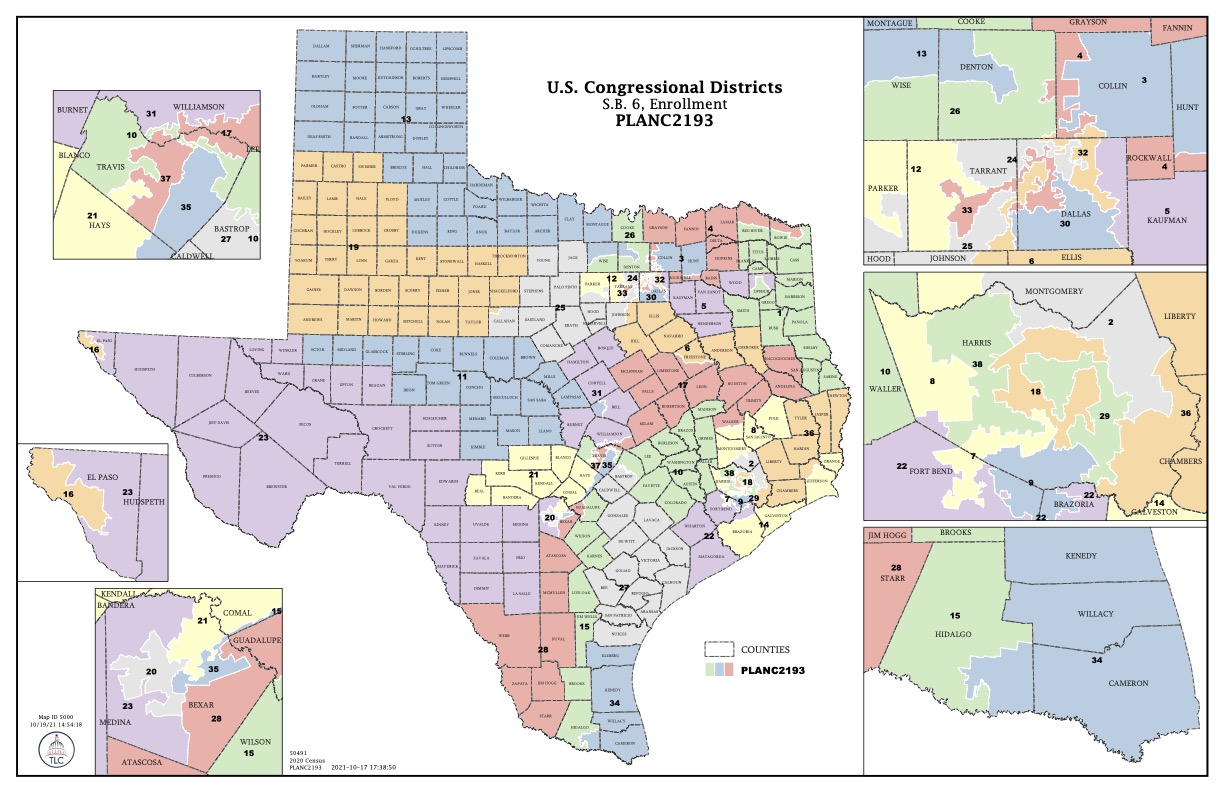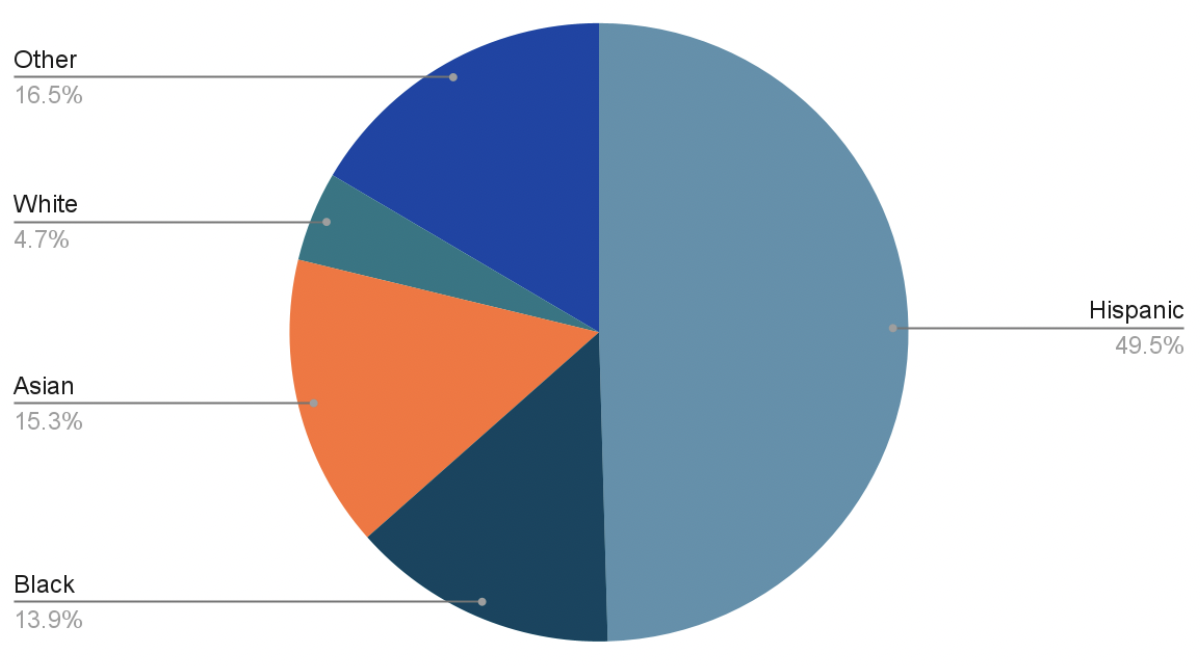
Some 279 days after first gaveling in back in January, at the end of a third special session, the Texas Legislature gave final approval to new district maps for U.S. Congress, Texas Senate, Texas House of Representatives, and the State Board of Education. If they withstand legal challenges, Republicans could virtually lock in political power over the next 10 years. The bills were passed largely on partisan lines, with Democrats voting no and Republicans voting yes.
News flash: The U.S. Census showed that between 2010 and 2020, Texas grew by 3,999,944 new residents, and more than 95% were people of color. Despite the tremendous population growth in communities of color within Texas, the maps approved by the Texas Legislature actually increase the power of white-dominated districts, in many cases “packing” and “cracking” communities of color.

Chart: Population Growth in Communities of Color Drives Growth in Texas Between 2010 and 2020 (Source: U.S. Census via Texas Association of Counties).
Even as the legislature was taking a final vote on maps on Monday, the Mexican-American Legal Defense and Education Fund (MALDEF) was announcing a lawsuit in the U.S. District Court for the Western District of Texas, El Paso Division, arguing the maps were intentionally discriminatory toward Latinx populations. They pointed out, for example, that the new U.S. Congressional districts would lower the power of the Latinx vote compared to previous maps even though Latinx people made up about half of the growth and an impartial map would have created two new Latinx districts.
“Unfortunately, Texas has continued its tradition of gerrymandered maps that slice and dice urban and suburban areas, and are carefully drawn to ensure that one political party maintains dominance rather than create a Texas where voters choose their politicians instead of the other way around,” noted Cyrus Reed, Conservation Director of the Sierra Club. “The Texas Legislature had every opportunity to draw fair, competitive districts that would have reflected Texas’s growing and diverse population. Hundreds of Texans and organizations provided common-sense solutions on how to draw fair maps but they were ignored.”
Reed called on Sierra Club members and all Texans to ask the U.S. Senate to immediately pass the Freedom to Vote Act and the John Lewis Voting Rights Advancement Act and not let anything block it’s passage. These bills would provide additional protections to Texas voters, including assuring that Texas maps met certain fairness standards making it much tougher for state legislatures to purposefully gerrymander districts and dilute the voices of their constituents. Recently, the U.S. Senate held a procedural vote to try and open debate on the Freedom to Vote Act, but not a single Republican senator voted to allow debate to move forward. It appears the only path forward to pass these common sense bills and protect all Texas residents will be to reform or eliminate the filibuster, which we adamantly call on the U.S. Senate to do.
In testifying on the U.S. Congressional maps for Texas, Reed noted the failure to add Latinx or minority-opportunity districts, as well as the large number of districts which chopped up urban areas, diluting communities of interest with more rural areas. One egregious example is new Congressional District 13, which stretches from the Panhandle to Wise and Denton Counties, which form part of the larger Dallas-Fort Worth area.
In addition to the MALDEF lawsuit, several other lawsuits are reportedly planned, and Reed said the Sierra Club may consider participating in those lawsuits, as there is an environmental interest in keeping communities together. From flood zones to watersheds to airsheds to highly industrial areas with pollution issues, cutting up communities of interest is not in Texas interest.
To see copies of the final maps, visit https://dvr.capitol.texas.gov.
To see copies of the Sierra Club’s testimony see here.
Other Legislative Action in the Third Special Session
While the four maps took up much of the focus, the legislature took other action as well. First, they approved HB 25, authored by Rep. Valoree Swanson (R-Spring), a bill that would ban transgender student athletes from playing on school sports teams that align with their gender identity. The bill is headed to Gov. Greg Abbott's desk after the Texas House accepted Senate amendments to the legislation in a 76-61 vote Sunday afternoon. While Sierra Club did not testify on these bills, we join with allies in opposing efforts to intentionally discriminate against children who are non-binary or do not identify with the sex of their birth. The bill is written so broadly that it would actually prevent female and male sports teams from practicing together.
Second, they approved a version of SB 8, which spends approximately $13 billion out of the American Rescue Plan Act (ARPA) of 2021. The bill that finally passed differed substantially from the bill that originally passed the Senate, and was improved considerably, though they purposefully held back about $3 billion in funds for future action.
Sierra Club had opposed SB 8 in committee due to the lack of any of the money going to programs like water infrastructure, parks, or energy efficiency, and the fact that more than $3.4 billion of the funds were slated to go to the Department of Public Safety, largely a swap with funds already approved by the Legislature during the regular session. The intent of the Legislature was to free up approximately $4 billion for property tax relief by replacing already approved funding with ARPA funding. The majority of the tax relief bill would have helped large industrial and commercial consumers avoid paying taxes.
In a rare bit of bipartisanship in the final days, the Legislature changed the appropriations bill considerably, shifting more of the money to healthcare and higher education, and removing the “swap” to DPS. Similarly, rather than approve a massive property tax bill that would have largely benefited industrial interests, the property tax bill (SB 1) was changed at the eleventh hour to merely increase the homestead exemption from $25,000 to $40,000 to provide about $200 in property tax relief to the average homeowner beginning next year. The loss in revenue to school districts will be made up by the state due to better than expected revenues. The change received bipartisan support and includes a constitutional amendment which must be approved by voters to increase the homestead exemption.
While the ARPA bill does not include most of the Sierra Club’s list of priorities, a small amount ($40 million) was dedicated to grants for park development and outreach, as well as $5 million for dune restoration programs in Brazoria County at the General Land Office and more than $1 million was dedicated to the new “Institute for a Disaster Resilient Texas,” an arm of Texas A&M that works on policies and programs to protect underserved Texans from climate extremes. The institute was only created in 2019 as part of the response to Hurricane Harvey and is housed in Galveston.
To see a full breakdown of the money approved in the ARPA bill, a copy of SB 8 as finally passed can be found here. It should be noted that the bill only adds up to approximately $13 billion, as the House and Senate decided to “hold onto” the extra money, potentially for future tax relief.
A few other controversial bills, including bills designed to prevent local governments or businesses from requiring coronavirus vaccines, and bills designed to require audits of elections or increase criminal penalties for election “fraud,” did not pass, as House leadership refused to advance them.
While rumors of a fourth special session abound, it appears there are no immediate plans for one now. Stay tuned.